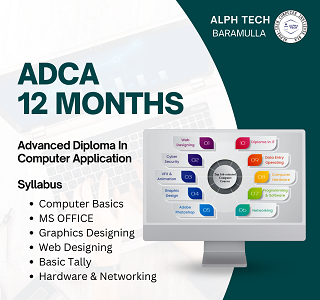
Advanced Diploma in Computer Applications (ADCA)
An Advanced Diploma in Computer Applications is an intensive and specialized program designed for individuals who want to elevate their skills and knowledge in the field of computer applications and software development. This advanced level course offers an in-depth exploration of various computer technologies, programming languages, and advanced software applications, preparing students for challenging roles in the dynamic world of information technology.
Course Overview:
The Advanced Diploma in Computer Applications (ADCA) is structured to provide students with a comprehensive and advanced understanding of computer science, software development, and IT management. This program typically spans one to two years, depending on the institution and curriculum, and it is tailored to equip students with the expertise required for more complex and specialized roles in the technology sector.
Curriculum Highlights:
- Advanced Programming: In-depth exploration of programming languages such as Java, Python, C , and others, including advanced concepts, algorithms, and data structures.
- Database Management: Mastery of database systems, including relational databases, NoSQL databases, and advanced SQL queries, for efficient data handling and analysis.
- Software Development: Advanced software development methodologies, tools, and frameworks for creating robust and scalable applications.
- Web Development: Proficiency in web technologies like HTML5, CSS3, JavaScript, and web frameworks (e.g., React, Angular, or Vue.js) for building dynamic and responsive websites.
- Networking and Security: Advanced networking concepts, security protocols, and cybersecurity practices to safeguard data and networks.
- Cloud Computing: Introduction to cloud platforms such as AWS, Azure, or Google Cloud, including cloud architecture and deployment strategies.
- Project Management: Skills in project planning, execution, and management to lead or contribute effectively to IT projects.
- Data Analytics: Advanced data analysis techniques and tools for deriving insights from large datasets.
- Ethical Hacking: Understanding of ethical hacking principles and practices to assess and enhance cybersecurity.
- Internship or Capstone Project: Practical experience through an internship or a comprehensive capstone project to apply acquired skills in a real-world context.
Key Benefits:
- Expertise: Graduates of an ADCA program possess advanced knowledge and skills, making them highly competitive in the IT job market.
- Career Advancement: This diploma opens doors to specialized roles in software development, database administration, IT management, and more.
- Versatility: The comprehensive curriculum allows graduates to work across a wide range of industries and domains, from finance to healthcare and beyond.
- Higher Earning Potential: Advanced knowledge often translates to higher earning potential, with many ADCA graduates commanding competitive salaries.
- Preparation for Further Studies: The ADCA serves as a strong foundation for individuals looking to pursue master's programs or other advanced degrees in computer science and related fields.
In conclusion, an Advanced Diploma in Computer Applications is a prestigious and specialized qualification that equips students with advanced skills and knowledge in various facets of computer science and technology. Graduates are well-prepared to excel in dynamic and challenging roles within the IT industry, making the ADCA a valuable investment in one's career.


